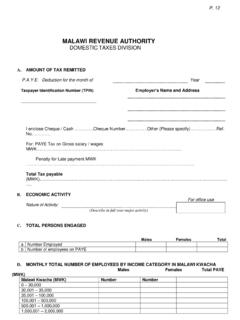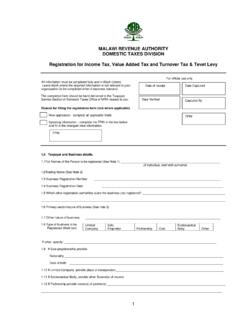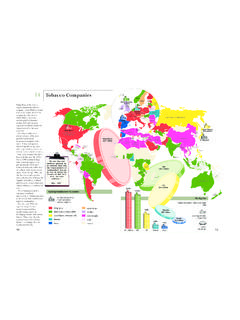Transcription of Chartered Accountant Malawi, CA (M) Professional ...
1 The ICAM Professional Qualification: review and recommendations Page 1 of 59 Chartered Accountant malawi , CA (M) Professional examination syllabus . december 2014 to June 2015 BUSINESS WITH CONFIDENCE The ICAM Professional Qualification: syllabus Page 2 of 59 1. The ICAM PQ syllabus Establishing a Professional qualification is about a range of activities and is much more than a syllabus and examinations. Working with the training partner the Professional qualification will have three integrated components to provide an in-depth understanding across accountancy, finance and business: Knowledge Skills Experience Combined, they help build the technical knowledge, Professional skills and practical experience needed to become a Chartered Accountant . Professional development Professional development prepares students to successfully handle a variety of different situations that they encounter throughout their career.
2 Ethics and Professional scepticism Ethics is more than just knowing the rules around confidentiality, integrity, objectivity and independence. It is about identifying ethical dilemmas, understanding the implications and behaving appropriately. Ethics will be integrated throughout the ICAM qualification in its exams and in the Professional development programme. 3-5 years practical work experience Practical work experience will be done as part of a training agreement with an authorised training employer. Students need to complete 450 days, which can take between three to five years. The ICAM Professional Qualification: syllabus Page 3 of 59 Accountancy, finance and business syllabus modules Each of the modules is directly relevant to the work that students do on a day-to-day basis.
3 They will gain in-depth knowledge across a broad range of topics in accountancy, finance and business. Students must pass every exam (or receive credit) there are no optional papers. This ensures that once qualified, all Chartered Accountants have a consistent level of knowledge, skills and experience. 2. syllabus and exams To create a full qualification with all the associated learning materials is not a realistic step in the short term. However, continued use of the technician exam (PAEC) and foundation (for non-relevant graduates) as the level 1 or certificate route is appropriate, subject to benchmarking and perhaps some amendments. In addition, the new Professional qualification must be competitive in terms of number of examinations, number of levels and price. It must also comply with the requirements of IES 1. It is recommended that a three level structure be followed.
4 These levels are: Knowledge level. The student will show knowledge and skills. Professional : Application level. The student will be competent to use the skills in context. Advanced: Higher level. The student will be able to analyse, apply and evaluate. At the lowest level questions in an exam will provide straightforward and structured data and information. At the next level questions will have straightforward but more complex data and information set in a more practical context. At the final level, there will be scenarios that are more professionally challenging asking for development of Professional advice. The syllabuses1 and examinations would be as follows: (a) Level 1 or Knowledge: This will be covered by the current technician qualification (PAEC), foundation (for non-relevant graduates) expanded by top up papers (full details of the benchmarking exercise and proposed syllabus are in below).
5 An alternative route is the relevant degree. It is essential that students have a good grounding before progressing to the level 2 papers. In essence they must be in the same position as an equivalent level ICAEW student. As such the following papers need to be sat. 1. Assurance 2. Business and Finance 3. Financial and Management Accounting Skills and Competence Assessment. For foundation students, it is also recommended that these students pass the PAEC technician taxation paper (TC10). (b) Level 2 or Professional : This will include four ICAEW papers and two papers developed locally. The two local papers will be Tax Compliance and Public Sector Accounting. The six modules build on the fundamentals and test students understanding and ability to use technical knowledge in real-life scenarios. Each module will.
6 The ICAM Professional Qualification: syllabus Page 4 of 59 have a written examination , which will be available to sit twice per year. These modules are flexible and can be taken in any order. (c) Level 3 or Advanced level: This will comprise two ICAEW papers. The Corporate Reporting and Strategic Business Management modules test students understanding and strategic decision making at a senior level. They present real-life scenarios, with increased complexity and implications from the Professional Level modules. The Advanced Level exams are fully open book, so they replicate a real-life scenario where all the resources are readily accessible. Sittings for Professional and Advanced papers will be twice a year. Regarding malawi Taxation and Public Sector papers, malawi law and basic taxation will have been covered in the Level 1 qualification.
7 At the Professional level it is recommended that two papers will cover these areas. A specific and detailed tax paper based on malawi practice called Tax Compliance ( malawi ). A second paper will examine public sector issues. The public sector is an enormously important area of the Malawian economy employing many accountants.. The ICAM Professional Qualification: syllabus Page 5 of 59 3. KNOWLEDGE LEVEL syllabus ACCOUNTING FRAMEWORK Aims of the module i. To develop the student s understanding of the fundamental principles and concepts of accounting. ii. To develop the student s ability to apply accounting principles in various practical accounting environments in line with regulatory and statutory frameworks. iii. To develop the student s ability to prepare, analyze and interpret financial statements.
8 Objectives By the end of the course the student should be able to:- i. Prepare financial statements for a variety of organizations within the regulatory framework. ii. Analyze the performance of a business using financial statements through ratio analysis. iii. Prepare basic consolidated financial statements for simple group accounts Format and standard of the examination paper The paper will consist of two sections; section A and section B. Section A will be compulsory with one question. The question will be on preparation of final accounts for various forms of businesses with some adjustments. This section will carry 40 marks. Section B will have 4 questions, each carrying 20 marks. Candidates will be required to answer any three questions from section B. Specification grid syllabus area Weighting (%) Maintaining financial records and adjustments to accounting records and financial statements 25 Accounting and reporting concepts 10 Accounting and reporting for various business organisations 50 Consolidated financial statements 15 Total 100 Learning Outcomes 1 Introduction to accounting In the assessment candidates may be required to:- Accounting and the accounting process (a) Define accounting (b) Define financial reporting recording, analyzing and summarizing financial data Qualitative characteristics of accounting information (a) Define, understand and apply qualitative characteristics.
9 Relevance, faithful representation, comparability, verifiability, timeliness and understandability Users of accounting information and their requirements (a) Identify various users of financial statements and their information needs Accounting principles and concepts (a) Define accounting principles and concepts (b) Explain the principles of accounting: going concern, accruals, consistency, double entry, business entity, materiality and historical cost The role of computers in accounting (a) Explain how computers are used in accounting systems (b) Consider the risks to data security, data protection procedures and the storage of data (c) Describe the accounting documents and management reports produced by computerized accounting systems and understand the link between the accounting system and other systems in the business The ICAM Professional Qualification: syllabus Page 6 of 59 (d) Outline advantages and disadvantages of using computers is accounting Regulation of accounting in malawi (a) Define, understand and apply accounting convention and generally accepted accounting principles (GAAP) (c) Understand the role of the regulatory system including the roles of the IFRS Foundation (IFRSF), the International Accounting Standards Board (IASB), the IFRS Advisory Council (IFRS AC) and the IFRS Interpretations Committee (IFRS IC) (d) Consider the role of the local regulatory system including Institute of Chartered Accountants in malawi (ICAM) and malawi Accountants Board (MAB) (e) Understand the role of International Reporting Standards 2 Accounting procedures and systems In the assessment candidates may be required to.
10 - Classification of business transactions (a) Understand a range of business transactions including: sales, purchases, receipts, payments, petty cash and payroll Elements of accounting information (a) Understand and identify the purpose of each of the main financial statements (b) Define and identify assets, liabilities, equity, revenue and expenses Source documents (a) Outline the contents and purpose of different types of business documentation, including: quotation, sales order, purchase order, goods received note, goods dispatched note, invoice statement, credit note, debit note, remittance advice, receipt Books of prime entry (a) Identify the main types of ledger accounts and books of prime entry, and understand their nature and function. The concept of double entry (a) Understand and apply the concept of double entry accounting and the duality concept. (b) Define the accounting equation.







![01 CFSC TAX RESEARCH FINAL REPORT[1]](/cache/preview/9/b/4/2/4/c/9/d/thumb-9b424c9d8e0a3364972be1ee73a14d4e.jpg)




